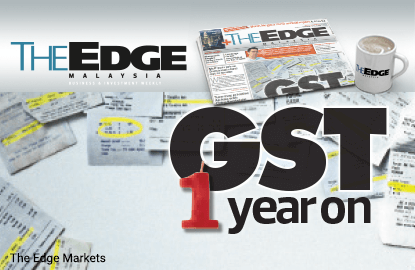

KUALA LUMPUR (March 26): It has been nigh on a year after the introduction of the goods and services tax (GST) in Malaysia on April 1 last year, but the country's citizens are no more happy or approving of it than they were a year ago — at least not going by the planned rally on April 2, albeit an opposition-led one — though the turnout remains to be seen.
Nevertheless, the clamour of unhappiness has been almost palpable, be it among consumers or businesses, because of the popular belief that the consumption tax has been responsible for pushing the prices of goods and service up.
And although Malaysia's inflation, measured by the Consumer Price Index (CPI), slipped to 2.1% in 2015 from 3.2% a year prior, thanks to the plummeting global oil prices, consumers lament that they have hardly felt the difference — and perhaps understandably so.
For CPI growth was volatile in 2015, wrote The Edge Malaysia in its cover story titled 'GST 1 year on' in its March 28-April 3 publication.
"It declined sharply at the beginning of the year to a low of 0.1% in February, but climbed up post-GST to peak at 3.3% in July, giving consumers a jolt in prices," it said.
There was also a clear pervasiveness of price hikes across the CPI's basket of goods, the weekly noted.
Pre-GST, the share of items in the CPI basket with inflation of more than 4% was at 11%. In the three months post-GST, it jumped to 32%, and then to on 41% by the second half of the year, as firms that had initially absorbed the new tax started passing it on to customers, it wrote.
And once prices go up, they hardly come back down again.
As a result, not surprisingly, the Consumer Sentiment Index dipped to a record low of 63.58 points, dipping "even below what was seen after the global financial crisis in 2009", as consumers became reluctant to spend, the paper noted.
However, while GST seems the easy target to blame for inflation and the slow down in domestic demand last year, it shouldn't be regarded as the only cause. After all, it only contributed to a 0.7 percentage point to headline inflation in 2015, according to Bank Negara statistics, which is actually lower than originally anticipated.
The government's subsidy rationalisation plan, the plunge in the ringgit's value against the greenback, and in some cases the mechanics of the free market, were all factors that also pushed up prices.
While the weekly's cover story looks into the effects of these factors and cited experts' reiteration that the GST is a "fairer" tax regime that has "come at the right time to shore up Malaysia's otherwise stretched public finances", it also noted that these arguments may still pale in comparison to consumers' sense of being "short-changed". Especially in view of the fact that the government has made little effort to keep to its promise of spending more efficiently.
For though the government originally allocated RM273.9 billion under Budget 2015 (80% of which goes towards its operating expenditure), it is now asking for more money — specifically RM5.99 billion in Parliament — to pay for what it actually spent in 2015.
Has the government, which used to be seen as helping out the rakyat, become one that is now counting on its people to "help out an administration whose finances are not in good shape"? Pick up a copy of The Edge Malaysia from newsstands around you today to find out more.
P/S: Don't forget — The Edge Malaysia can also be downloaded from Apple's Newsstand and Androids' Google Play.
Save by subscribing to us for your print and/or digital copy.
P/S: The Edge is also available on Apple's AppStore and Androids' Google Play.